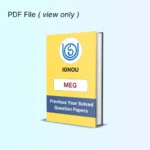MEG-08 Block 6 Summary | Caribbean Poetry: Derek and Edward
- Last Updated On October 14, 2025
Table of Contents
Here you will get the detailed summary of IGNOU MEG 08 Block 6 – Caribbean Poetry: Derek Walcott and Edward Brathwaite.
We have provided the summary of all units starting from unit 1 to unit 6.
Introduction
Block 6 of MEG-8 explores the rich and politically charged terrain of Caribbean poetry, especially through the works of Derek Walcott and Kamau Brathwaite. The block contextualizes their poetry within the traumas of colonialism, slavery, and cultural hybridity, and also examines the theoretical lenses used to study Caribbean literature. Through these poets, the block captures the aesthetic, historical, and ideological evolution of a region that sits at the intersection of Europe, Africa, and the Americas.
Unit 1 – Introduction to Caribbean Poetry
This unit provides a historical and thematic overview of Caribbean poetry, outlining the socio-political and linguistic landscape that shaped it.
Key Themes:
-
Caribbean literature arises from a history of colonialism, slavery, indentureship, and resistance.
-
It often explores displacement, diaspora, racial identity, language politics, and the recovery of lost histories.
-
Poets use both Standard English and Creole, and their work blends oral traditions with European literary forms.
-
Caribbean poetry is not only artistic but also politically resistant — reclaiming voice and identity from colonial silencing.
This unit frames poetry as a space of cultural survival and reconstruction, rooted in history, hybridity, and linguistic experimentation.
Unit 2 – Derek Walcott I
This unit introduces Derek Walcott, a Nobel Laureate from St. Lucia, and explores his background, themes, and poetic concerns.
Key Insights:
-
Walcott was born in a mixed-race, Anglophone Caribbean context, and often grappled with cultural duality.
-
His early poetry reflects the tension between European heritage and Caribbean identity.
-
He was deeply influenced by classical literature (Homer, Shakespeare) and Christian imagery.
-
Key themes:
-
Exile and return, colonial trauma, landscape and memory, and art as redemptive.
-
-
Uses elevated diction and mythological allusions to rewrite Caribbean experience in global literary terms.
Walcott’s poetry reflects a search for wholeness in a fragmented, postcolonial world.
Unit 3 – Derek Walcott II
This unit offers close readings of some of Walcott’s most important poems, such as:
Poems Analyzed:
-
“A Far Cry from Africa”: Expresses Walcott’s torn identity between African ancestry and British education during the Mau Mau uprising.
-
“Ruins of a Great House”: Reflects on colonial ruins and moral decay using the metaphor of an English manor.
-
“Codicil”: Examines the poet’s emotional and cultural displacement in exile.
Techniques:
-
Use of enjambment, intertextuality, symbolism, and historical layering.
-
Language often oscillates between personal lyricism and political critique.
This unit shows Walcott as a poet of moral conscience, who refuses simplistic binaries, and instead creates complex, multilayered poetry.
Unit 4 – Kamau Brathwaite I
This unit introduces Edward Kamau Brathwaite, a Barbadian poet and historian, known for his Afrocentric aesthetics and revolutionary poetics.
Key Context:
-
Brathwaite foregrounds African cultural survivals in the Caribbean.
-
Opposes colonial English with a call for nation language — the voice of the enslaved and the oral tradition.
-
His poetry reclaims Caribbean history from below — that of the enslaved, the displaced, and the silenced.
Major Themes:
-
History as oppression and resistance, linguistic decolonization, African spiritual traditions, and anti-elitist expression.
This unit contrasts Brathwaite’s earthy, oral-rooted poetry with Walcott’s European-classical leanings, establishing a key literary polarity in Caribbean poetry.
Unit 5 – Kamau Brathwaite II
This unit analyzes some of Brathwaite’s most influential poems, drawn from collections like Rights of Passage and Masks (from his trilogy The Arrivants).
Features:
-
Brathwaite uses broken syntax, unconventional punctuation, and typographic innovation to mimic the rhythm of Caribbean speech and drumming.
-
His work explores:
-
Middle Passage and slavery
-
Cultural loss and regeneration
-
Reclaiming African identity in the Caribbean context
-
-
“Negus”, “Caliban”, and “Limbo” are among his widely studied poems for their ritualistic tone and political urgency.
This unit highlights Brathwaite’s aim to create a “nation language” that expresses the soul of Caribbean resistance and survival.
Unit 6 – Theoretical Paradigms for Caribbean Literature
This final unit provides theoretical frameworks through which Caribbean literature, particularly poetry, can be analyzed.
Major Theoretical Approaches:
-
Postcolonialism: Focuses on identity, hybridity, mimicry, and resistance to colonial power structures.
-
Hybridity (Homi Bhabha): A cultural space where colonial and native cultures intersect, creating something new.
-
Creolization (Édouard Glissant): The mixing of languages and cultures in a productive, ongoing process.
-
Language debates: Walcott’s preference for English vs Brathwaite’s call for nation language reflects deep tensions.
-
Subaltern Studies: Caribbean poetry as the voice of those excluded from official histories.
This unit encourages students to see Caribbean poetry as not just artistic output, but as critical intervention in historical, linguistic, and ideological narratives.
